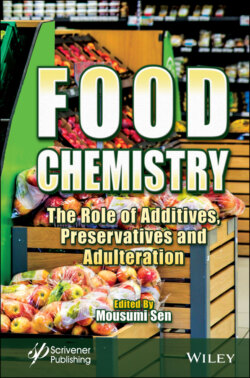Читать книгу Food Chemistry - Группа авторов - Страница 57
1.12 Food Safety and Standards Act
ОглавлениеThe main objective of the food law is to provide safe, healthy, and nutritious food, to the citizens. The first ever food adulteration act was given in 1947 which was Vegetable Oil Products Order. This order was for control and improving the quality of vegetable oils which was further replaced by Edible Oil Products (Regulation), 1998. An organized manner was set up within the organization for production, transportation, and selling of goods. Many companies came into loss after the implementation of this act [78, 82, 87]. The head of these edible oil manufacturing company has the rights to form proper safety measures so that there should not be any fault and it is fit for consumption purpose, and set of rules should be set. (Prevention of Food Adulteration Act, 1954). It includes food quality, usual method of sampling, analysis of nutrients, powers of governing officials, proper punishments for fraudsters, those include additives, coloring, preservatives, labeling, packing stopping, and monitoring the sales, and another act was The Fruit Products Order (1955). This act is important and looks after the goods which are used daily; therefore, it comes under such section only. The main purpose of this is to look after the production vegetables and fruits, its hygiene, and control in the area of production only to as to maintain the quality of the goods and it comes under this act. All the producers of such products which make other products by using these as primary products should get a certified permit so that they can produce within the vigilance government (The Meat Food Products Order, 1973). Meat products are permitted and looked after during the production of complete meat products and enforcement of strict policies of government at every step of analysis, and it is to be kept in mind that during the storage, it should be frozen completely. In MFPO, various producers of meat products are engaged in producing, storing, and labeling, and the permit should be kept while selling the goods such as in restaurants and hotel (The Solvent Extracted Oil, De Oiled, and Edible Flour Order, 1967). All the oils should be refined before selling it to the consumers, and it should be labeling before selling. It should be mentioned fit at the time of sell. The following are its features:
1 1. It also looks after the production, quality, and transportation of the all types of oils and flours.
2 2. It provides quality assurance to the people for the nourishment products which are been purchased.
3 3. It eliminates the used of edible oils for other purposes.
4 4. The products which are unfit for consumptions are been expelled out and are labeled as unfit and are not for sale.
All these acts came under one act that is Food Safety and Standards Act (2006). This act illustrates the detailing and authorization of the safety act in India and was enacted by the FSSAI. The FSSAI works under the control of health department of India which works for the welfare of Indian families. The fundamental points of this act are as follows:
1 1. Set down science-based measures for articles of nourishment.
2 2. To organize work of distribution, manufacturing of products, storage in proper places, its import, and selling to proper authorized.
3 3. To ensure safety of food.
All above-mentioned laws were signed under the FSS 2006 Act. Certain guidelines have been formulated by the government for the research purposes, and the scientist those work for the food safety measure should work with some objectives and these were as follows:
1 1. They should come up with new ideas which helps in growing the country and provides some knowledge so that India should also compete with international institutes.
2 2. For building various laws, the researches which are carried out should be illustrated easily.
The organization which is working under the development of food safety measure should command various food safety measures for regulation of its standards, and these capacities not withstanding others incorporate setting down methodology and rules for notice of certify labs. There are some rules for permitting license under this government organization which are mainly three types:
1 1. Registration: for turnover under twelve lakh rupees.
2 2. State permit: for turnover between 12 lakhs to 20 crore.
3 3. Central permit: for turnover above 20 crore rupees.
There are various other criteria also which are needed at the time of assessing the permit.
